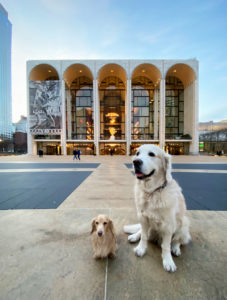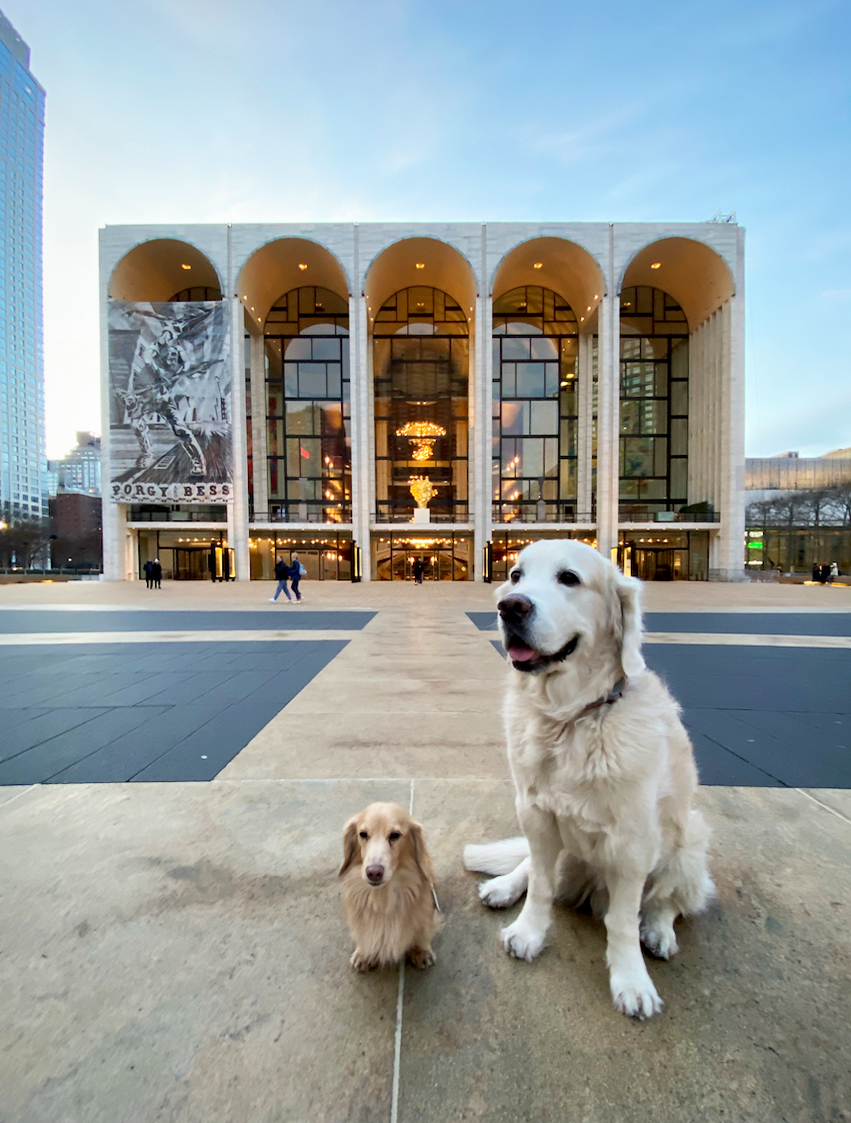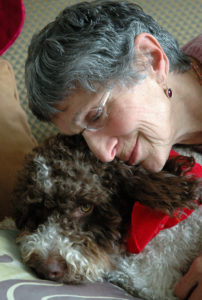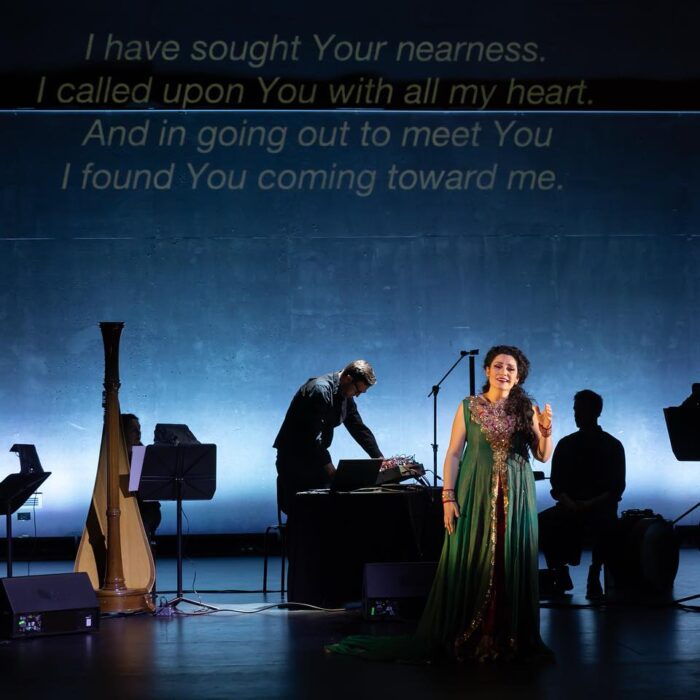
The Wonderful World of Opera Dogs: Luca Pisaroni, Ailyn Pérez, Leah Crocetto, Brian Jagde on COVID & their Canine Companions
By Diana BurgwynOperaWire is proud to present “The Wonderful World of Opera Dogs,” a series by Diana Burgwyn, which will focus on the relationship between opera’s most iconic stars and their beloved canines. The creation of this series and all research necessary for each individual piece were conducted solely by Diana. To learn more about the origins of the project, click here.
Dogs have held a place of importance in the lives of opera singers throughout the history of this art form. But 2020, when COVID-19 burst onto a shocked world, was a year unlike any other for the profession of opera. Did dogs help the singers cope with the harsh realities they faced? And, having been virtually without a career during that long year, how did these artists get by—did they change, grow, learn? Four major singers respond to those questions.

Luca Pisaroni
The charismatic Venezuela-born Italian bass-baritone Luca Pisaroni is particularly known for his Mozart interpretations (among them both
Don Giovanni and his servant Leporello); an extremely versatile singer, he has portrayed all four villains in Offenbach’s “The Tales of Hoffmann.”
Pisaroni and his wife, Catherine, have been accompanied on almost all those international jaunts by their dogs Lenny, a Golden Retriever known as Lenny 2.0 (replacing his deceased precursor, Lenny 1.0), and Tristan, a miniature longhair Dachshund. The canines are almost as famous as Pisaroni, with over 8,000 followers on their Instagram account.
The COVID-19 pandemic ended travel for both singer and dogs. For Pisaroni, the cessation of live performances came as a terrible shock.
“For weeks I read the newspapers and did nothing else,” he says. “I was paralyzed as one booking after another was canceled.”
The dogs had no such issues. In fact, says the singer, they were “delirious” with happiness because he was around them all the time in their Vienna home—no rehearsals, no evening performances, no waiting for him patiently for their middle-of-the-night walk. “I’ve never been around them so much,” says Pisaroni. “I walk them over and over all day long. They think it’s amazing!”
Pisaroni credits Lenny and Tristan for helping him get through the pandemic. “They have been a blessing,” he says. “I would never have survived it without them.”
Furthermore, the dogs have served as a role model. “They live in the minute only.” This has enabled him to focus more on the here and now, to “let go and let destiny take its course.”
As live performances vanished, streamed events filled the gap in Pisaroni’s schedule to some extent. There was, for instance, the opening night of Salzburg’s annual Mozart Week in January of this year and the world premiere of “Tales from a Safe Distance,” encompassing nine-one act operas inspired by Boccaccio’s “Decameron,” and a tenth wrap-around story featuring Pisaroni. These events, he says, were very challenging.
“Rehearsing with no audience is fine. But a performance without an audience is weird. Opera is an artistic form to be consumed together. As a singer, you feel the audience, you exchange emotions with them.”
Pisaroni looks to the future with hope as the coronavirus lessens its grip but he still fears postponements, cancellations. He is particularly looking forward to the world premiere of the Paris Opera’s “Le soulier de satin” (“The Satin Slipper”) by Marc-André Dalbavie at the Palais Garnier in May-June of this year. The six-hour 50-minute opera is a parable based on a Chinese legend about two celestial stars in love, which had been dramatized by the French poet Paul Claudel. Pisaroni takes on the leading role of Don Rodrigue.
Concerned that when theaters reopen, people who have become accustomed to streaming will not want to go back to live performance, Pisaroni urges them to return, not only for the sake of the art form but for their own pleasure. He remembers having listened to Pavarotti in recordings years ago. “But when I heard him live the first time I got goosebumps. It’s something I will never forget.”
Then Pisaroni returns to the subject of dogs. “Everyone should get a dog. We’d be much better human beings.”

Leah Crocetto
American soprano Leah Crocetto has proved her mettle in some of opera’s most cherished roles: Desdemona, Aida, Tosca, Norma, Liù, among them. Her voice—warm, penetrating, and luxurious, with agile coloratura—is ideally suited to the Italian repertoire.
The coronavirus pandemic hit at a bad time for Crocetto, causing her to miss out on both role debuts and house debuts. She was especially looking forward to a 2020 recital with mezzo-soprano Jamie Barton in Dallas as well as an Elisabetta in “Don Carlo” there, also with Barton.
The recital was rescheduled for April of this year but, as luck would have it, a contractor involved with it developed COVID-19, causing yet another cancellation.
“It has been total devastation,” Crocetto says. “The first couple of months, I was completely depressed and unsure and scared.”
Helping her through the pandemic was a delicate little Maltese terrier with a soft white coat named Ernie (his full name is Ernest Hemingway), who will turn nine in May. Crocetto says she would joke with her friends that that dogs had intentionally created Covid so that their owners would be home with them more. Certainly Ernie has enjoyed her fulltime presence over the past year. The coronavirus, however, is no joke for the soprano. She lost two people—her great-uncle and an aunt—to the disease. These experiences affected her deeply.
“COVID made me realize what is really important,” she says. “While my job singing opera is very important to me, I can live without it. I don’t mean that I’m not anxious to have the singing back—because I am—but I realize that what matters most are the relationships with my family.
“Thankfully my alma mater, Siena Heights University in Michigan, where I got my degree, asked me if I wanted to teach this year and that has been my saving grace. The kids are amazing, and I have formed deep relationships with some of them. I’m also directing a musical there. My dog comes with me and he just loves it—loves the kids, loves that he gets more mommy cuddles.”
The two have shared a number of European jaunts, a favorite destination being Venice. There the gondoliers outside their apartment near St. Mark’s Square came to know Ernie.
“Every day,” says Crocetto, “they would greet the ‘leetle’ white dog, Ernesto. Everywhere he goes, everybody smiles. It’s spectacular to have this warm ball of fur with me when I travel.”
Ernie won’t be able to accompany his mistress as she takes on “Aida” at Opera Australia in Melbourne and Sydney. It’s too long a trip for the little guy. Instead, he will be with Jim (a father figure to Crocetto and grandpa to Ernie), where he will doubtless be treated like royalty.

Brian Jagde
It may seem strange that an exciting tenor with a ringing voice and a powerful build would decide to give his little dog a big name: Cavaradossi. But when you shorten the name to “Cav,” which is what Brian Jagde calls his Cavalier King Charles / Cocker Spaniel mix, it seems more appropriate. Furthermore, the role of Tosca’s lover is one of Jagde’s favorites.
He obtained Cav when his career was taking off and he was traveling constantly, taking on one major tenor role after another—Don José, Radames, Fidelio, Des Grieux, among them.
“It was pretty lonely to be a single guy on the road,” Jagde says, “so, having grown up with dogs, I decided to get a puppy and train it from scratch.”
Choosing Cav from a photo of newborn puppies, he expected a smaller dog and a different breed mix. No matter — he was totally smitten with Cav from the beginning.
“He will have that adorable baby face forever,” the tenor says.
At 12 weeks, the puppy was already flying with him. So accustomed did Cav become to the jet-setting life that when he feared Jagde might be leaving without him, he would have an anxiety attack. Over the past year, of course, travel has been denied to both human and canine. Now married to another dog lover, Jenna Wolf, the tenor has only one complaint.
“Cav is totally enamored of my wife, he is severely oedipal. When I’m in the room with her, I hardly exist.”
The unexpected arrival of COVID-19 was, says, Jagde, an emotional roller coaster. Preparing for a role, he would enter a state of mind that conditioned him for the job. Then the production would be canceled. Another role undertaken, another cancellation. Jagde says he lost over 80 percent of his income last year, but he was able to do one recording (Mahler’s “Das Lied von Der Erde” in Shanghai and Turiddu in “Cavalleria rusticana” in Vienna before the lockdown.
“That little burst of energy helped to sustain me” he says.
Jagde made the most of the free time. His teacher Michael Paul, who lives near him in New York City, began working with him on technique three to five times a week. They did not wear masks but otherwise took all precautions. In that sense the hiatus in career was a blessing.
Jagde is deeply committed to providing children with the kind of music education he had while growing up but is absent from the curriculum today. He also has been involved with the project Opera for Peace since its founding in 2019.
“One of its goals,” he says, “is to bring opera from one end of the world to the other. In the middle of Africa, for instance, we as Americans don’t think of opera existing as an art form, but it does there, and expresses not only the beautiful things but also the bad in the world.”
Opera for Peace also helps young artists launch their careers, providing opportunities and connections they otherwise would not have
Jagde will take on two roles at the Metropolitan Opera next season: Pinkerton in “Madama Butterfly” and “Tosca’s” Cavaradossi—or should we say Cav?

Ailyn Pérez
When Tequila, a long-haired Chihuahua mix from Mexico was a tiny puppy, soprano Ailyn Pérez remembered, “I could hold her in my two hands.” Since then, the singer and her dog have had almost 15 years together.
“She is my first and only dog, and I adore her,” she says. “I remember thinking how could someone be so attached to a pet? But when you have one, it’s different. I’m hers, and there is a sense of comfort and peace with her, and play—she invites me to play.”
Tequila used to travel everywhere with Pérez. But now a long flight is too hard on the dog; she becomes stressed and it takes her a long time to transition from one setting to another. So when Pérez embarks on her post-pandemic world travels, Tequila will be with close family members in Chicago, living an old dog’s peaceful life of routine until his mistress comes home and is with her all the time.
Despite the cancellation of many roles and contracts in 2021, Perez maintains a spirit of gratitude for having been fortunate enough to sing some of the most important soprano roles in the repertoire at leading opera houses worldwide and to have had a few appearances before everything shut down. Beloved by audiences for her radiant portrayals of such roles as Violetta, Thaïs, Rusalka, and Micaëla, she is using the free time she has now to focus on her 2022 role debut at the Met as Tatiana in Tchaikovsky’s “Eugene Onegin,” learning the difficult Cyrillic alphabet.
Such intense musical study is reminiscent of the preparation Pérez undertook as a student at the Academy of Vocal Arts under Maestro Christopher Macatsoris.
“During the pandemic,” she says, “I have had the time to go back to basics. As a performer, if you’ve done a role many times, you think you have uncovered everything, but when you go back you think, did I really honor that rest mark, is what I’m doing here more following tradition than doing what the composer indicated?”
Pérez has experienced a melancholy, a joylessness shared by many artists, which resulted from the lack of human contact during the past year.
“There is a poignancy to every opportunity we have to sing,” she says. “Recently I was one of four soloists in a concert conducted by my dear friend Lorenzo Viotti, a creative, wonderful person. One of the arias was ‘La Mamma Morta’ from ‘Andrea Chenier,’ which I had never touched. There is such profound sadness in it. During a rehearsal I completely broke down, which I didn’t expect—it was gushes of tears.”
Realizing how devastating the pandemic has been for young artists just starting their career, Pérez has joined up with like-minded friends and created online courses, helping the younger generation of singers in such areas as role preparation, foreign languages, and connecting them with conductors, composers, pianists and teachers. Her biggest concern is not just getting the singers back onstage but restoring the careers of orchestra members, stage crew, chorus.
“Opera is not a solo job, it’s a grand-scale type of performance,” she says.
Hopefully, the joyfulness will return soon for Pérez, Jagde, Crocetto and Pisaroni, as well as all those whose life is opera.
Categories
Special Features


